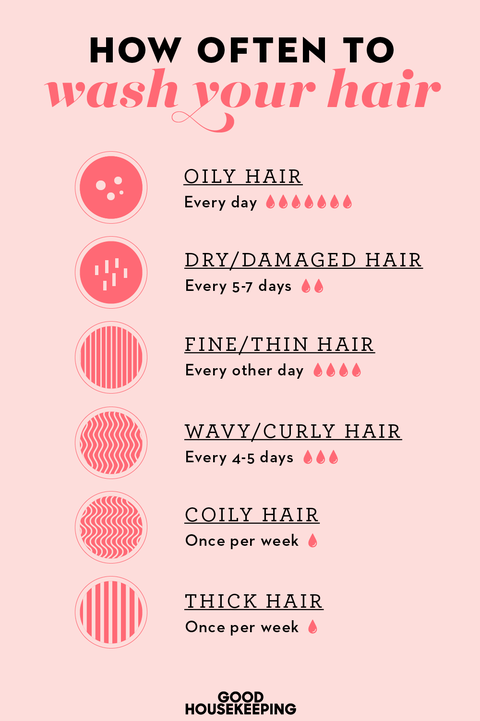“How often should I wash my hair?” is hands down one of the most common questions hairstylists get asked on a daily basis. But it doesn’t necessarily have a straightforward answer. Just like you’d use a different shampoo for different hair (and scalp) types, you also follow a different set of rules when it comes to cleansing.
“Washing your hair is not a one-size-fits-all process,” says Erinn Courtney, a hairstylist and natural hair expert in Los Angeles. “Our hair is not made equally and needs special care. Finding what works best for you — in terms of the right shampoo and frequency of washing— can take trial and error and doing some research.”
How often to wash your hair:
We went straight to the pros to find out how often you should be shampooing your strands, based on hair type. But before we get into the details, here’s a little background on why you should be shampooing in the first place.
“Washing your hair is important for hair growth,” Courtney says. “It relieves your hair of product buildup and dermatitis that can negatively affect your scalp.” Shannon King, partnering artist with KMS Hair, adds that “not cleansing your hair can lead to issues with dryness, tangles and ultimately, hair loss.” The bottom line: As long as your hair and scalp are healthy, your hair will grow.
But whether you should wash hair daily really depends on your specific hair type and the shampoo you are using. “Washing your hair every day can cause dryness and breakage, but generally will not cause excessive hair loss,” shares Angela Styles, a hairstylist in West Hollywood, CA. While some hair types should avoid a daily wash for those reasons, those with super oily hair “can benefit from washing every day because of the amount of oil it produces,” Courtney explains.
Finding the right balance can be tricky. Generally, if your hair isn’t greasy or dry, you should cleanse it every two to three days, King recommends. But if you wash hair too often for your hair type, “it could be very drying to the hair, depending on the ingredients in the shampoo,” King says. Whereas if you wait too long in between shampoos, “you could end up with a scalp that is very clogged, meaning hair won’t be able to grow out of the follicle the way and at the rate that it’s supposed to.”
But there’s no need to stress about shampooing. Here, our pro hairstylist’s guidelines for the best washing routine for your hair type:
Oily hair: “Typically you would want to wash your hair every day to prevent build-up, unless you have very long hair or it’s very coarse or curly,” King says. Dry or damaged hair: While noting that it depends on the level of damage and dryness, King typically recommends shampooing every five to seven days, as “you may need to allow some [of the hair and scalp’s] natural oils to get in the mix until that time.” Courtney adds that “if hair is dry and damaged, it could be that you’re shampooing too often.” Make sure not to overuse a clarifying shampoo, as it can strip the hair of the nutrients it needs to be healthy and may allow it to become dry and damaged. Wavy or curly hair: Shampoo every four to five days, King suggests. “It will depend on the density of the hair, but this is a good estimate for this hair type.” If that seems like too long of a stretch, shorten it by a day or two and see how your hair and scalp react.Coily hair: Both Courtney and King suggest washing once per week for optimal hair growth. “Don’t forget to follow with conditioner,” King adds. “It’s equally as important to condition as much as it is to cleanse.”Fine or thin hair: “Fine hair will need to be shampooed as often as every other day to provide it with the moisture it needs to flourish and grow,” Courtney says. Cleansing also helps remove buildup and oils that can weigh fine or thin hair down. Thick hair: “Thicker textures tend to hold onto moisture, so washing once per week is sufficient,” Courtney advises.
How does the season affect your shampoo schedule?
Seasons change, and so does your hair regimen. Colder weather typically causes scalps to become drier and sometimes produce more dandruff. “Shampooing more often, such as daily or every other day in the winter, can be helpful for those who experience more dryness and dandruff,” Courtney says. During the summer, people tend to shampoo less often, especially those with curlier or coiled textures. “This allows time for people with drier scalps to produce natural moisture and let it distribute through the hair strands before wash day,” she explains.










































